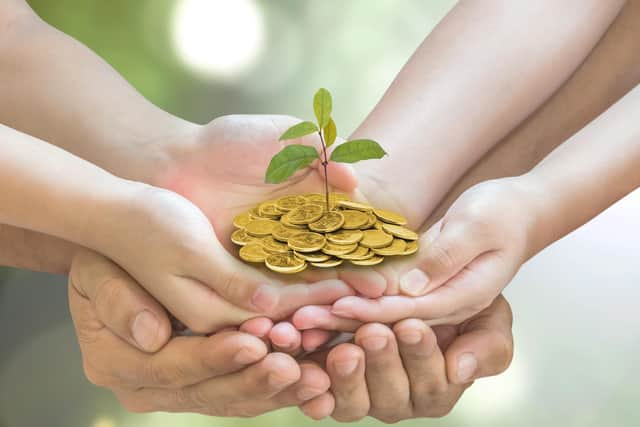On eve of Earth Day UK climate change is under microscope


With Earth Day on April 22, this is a great question to ask at a really pertinent time.
If you didn’t manage to catch David Attenborough’s Wild Isles on BBC1, I’d thoroughly suggest watching it on iPlayer.
Advertisement
Hide AdAdvertisement
Hide AdIt’s a stunningly beautiful love letter to the nature on our wonderful island and shows animals, insects, flora and fauna just as beautiful as that on the great plains of Africa or the jungles of the Amazon.


Sir David himself says our seas are among the richest in Europe and he’s absolutely right of course (although, when is he wrong?).
While his narration is as beautiful as the scenes on screen, he does urge action and he’s right to do so.
Yes, our seas are some of the richest in Europe – at the moment.
Advertisement
Hide AdAdvertisement
Hide AdWe know they are warming up and raw sewage is being dumped into them though so will that still be the case in five, ten or twenty years time?


There are stunning shots of wild hay meadows, sprinkled with wild flowers and the sound of buzzing in the air – yet amid the beauty, we’re reminded a staggering 97 percent of hay meadows have been lost in this country in the last sixty years – really, 97 percent in just six decades.
Despite showing us incredibly engineered butterflies, moths and bees, we learn 60 percent of the British Isles flying insects have disappeared in the past twenty years, that’s just two decades to wipe out millions of insects and far too many species.
Decades ago you couldn’t get to your British seaside holiday destination without the windscreen being covered with bugs, so when was the last time you hit one on the motorway?
Advertisement
Hide AdAdvertisement
Hide AdIt might not be a pleasant example but it’s proof in the pudding. We know the seasons are changing and we know that’s down to climate change – from heatwaves in summer to snow in Spring and droughts and floods.


Our island is getting warmer. The UKs growing season in the late 19th century was 244 days, it’s now five weeks longer which might sound great but it’s hotter too which is affecting the delicate equilibrium of our eco system.
Pollinating insects aren’t thriving which affects farms across the country. Pests aren’t wiped out by cold snaps which can decimate entire crops. It might feel like we’re powerless to affect the change but we’re not. Every gram of carbon saved by cycling, using an electric car, taking the train rather than the plane and eating less meat and seasonally matters.
There’s so much beauty on our island to still enjoy, Sir David’s testament to it will hopefully inspire even more people to start thinking about their own impact on the island we live on.
Advertisement
Hide AdAdvertisement
Hide AdCelebrity spot
With Earth Day being the biggest ecological topic this month, the scientist, vegetarian and environmental campaigner Dame Dr Jane Goodall (photo: Getty Images) believes that we all have our part to play in taking care of the planet we all share and the one we live on.
The award-winning animal activist said: “You cannot get through a single day without having an impact on the world around you.”
She added: “What you do makes a difference, and you have to decide what type of difference you want to make.”
Green swap
Swap your pension for an eco friendly one (photo: Adobe). In 2021, £128 billion was invested in fossil fuels from UK pension funds. Anyone with a pension around £30,000 transitioning to a sustainable one could save around 19 tonnes of carbon a year.
Advertisement
Hide AdAdvertisement
Hide AdFinding ways to change your carbon footprint
I’m often asked what’s the biggest single change any of us can make when it comes to reducing our carbon footprint.
It’s hard to answer with just one item or just one change because it depends on your lifestyle – if you drive thousands and thousands of miles in a diesel car every year, switching to an electric vehicle might be the answer but if you only get the bus, it’s not.
The one thing almost all of us do – some of us more relentlessly than others though, is consume.
Whether it’s food with big food miles attached to it, fashion, tech, holidays, or cars.
Advertisement
Hide AdAdvertisement
Hide AdWith that in mind, it might come as a shock that household consumption (of everything) is responsible for more than 60 percent of global greenhouse gas emissions and 50 – 80 percent of total water, land and resource use.
Those figures are frightening but they’re also brilliant (bare with me) because they’re something we’re in control of.
Those numbers aren’t down to big oil companies flaring gas or agro-industries chopping down rainforests, all of which are out of our direct control, they’re down to what we put in our baskets – both the actual and virtual ones – every day, week, month and year and that’s something we have complete control over.
But how do we stop buying and wanting stuff?
Firstly, use what you have.
Do you really need a new pair of shoes or are the ones on your feet sufficient?
Advertisement
Hide AdAdvertisement
Hide AdI’d argue if they’re not leaking or damaged, you can stick with them.
Secondly, think about repairing rather than buying new.
Before you opt for the latest iPhone, can yours get a software update or can you delete what’s on there or store it on an external hard drive to free up some space if it’s a storage issue? Repairing the soles of your shoes is far cheaper than buying new.
Next borrow, if it’s something you’re not likely to use often life a ladder or drill, then borrow from a pal.
You don’t need to buy new dresses for each wedding you’re invited to when there are so many dress rental companies around. If that doesn’t work for you, think about swapping.
Advertisement
Hide AdAdvertisement
Hide AdThere are numerous online swap shops and Facebook groups so sign up and get swapping. Next, think about if you really have to buy new? Second hand can be just as good and you can help your wallet as well as the planet by bagging a bargain and taking something that might have eventually ended up in land fill.
If you’ve exhausted all of the above, then by all means buy whatever it is you need or want after a day or two to avoid impulse purchase. You’ll be surprised at how much money you will save by reducing your consumption with some of the tips above.
Fact or fiction
Last Decade Was Hottest in 125,000 Years. Fact. The UN’s IPCCs assessment report 2021 concluded that last decade, 2011 to 2021 was hottest ten years for previous 125,000 and that upward trend doesn’t show signs of cooling.